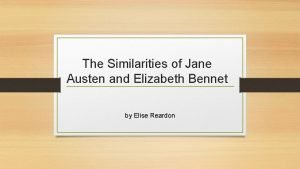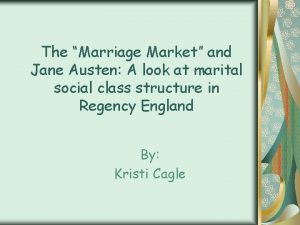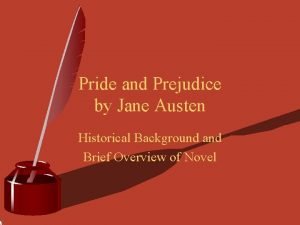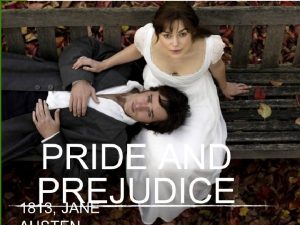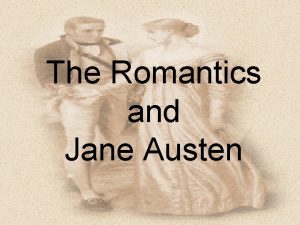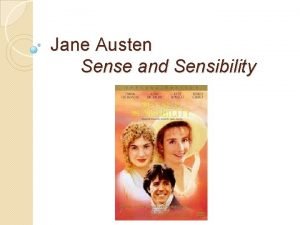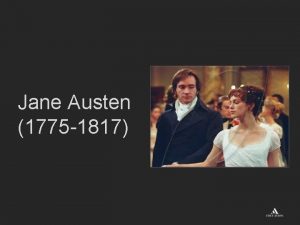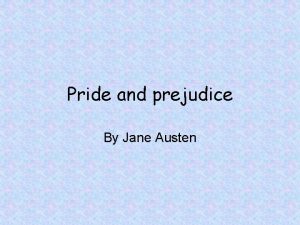Justice in the World of Jane Austen Advocating





- Slides: 5

Justice in the World of Jane Austen: Advocating for Lydia Bennet and Maria Bertram Madison Tuck, Loyola University New Orleans Advised by Dr. Sarah Allison

Introduction ● ● ● At the end of Jane Austen’s novels, readers are left with romance and a sense of justice. The good are rewarded with love, money, and a happy ending, while the evil are punished according to their shortcomings. The justice enacted at the expense of Lydia Bennet, the flirtatious, impulsive, and silly sister of Pride and Prejudice’s Elizabeth Bennet, and Maria Bertram, the vain, classist, and naive cousin of Mansfield Park’s Fanny Price, is not justice at all, even though it feels like the kind of karma readers want to savor. Their fates are not actually results of their personal faults and poor choices, but the typical, calculated outcome of a cruel patriarchal justice system fueled by an equally unforgiving society. The effects of these “sentences” follow the women and their families forever in a way that modern readers can rarely comprehend, while others reap benefits from their social demise. Woodcut illustration of Mansfield Park, Chapter 11 by Joan Hassall Domestic Fiction and the Law ● Learning about the law of Jane Austen’s time can help modern readers to better understand the plots of Pride and Prejudice and Mansfield Park, but for women of her time, domestic fiction offered a way to understand the legal system and how it affected them. ● Literature helped the public to comprehend the law because it streamlined the law’s complex and contradictory elements into a coherent narrative about the legal position of women. In doing so, novels exposed problems such as the existing law’s inability, or straight unwillingness, to provide rights to women. ● In addition to showing how the law was applicable to women’s lives, novels circulated much more frequently and easily than the publication of case law which was not regularized until the nineteenth century. So, ideas about the law spread more quickly and widely in the novel than official records. ● The domestic novel forced society to take a hard look at the laws in place and realize that they were not living up to their ideals. Since the portrayal of the law was relevant at the time of Austen’s publications, it provides important context when reading her stories now. The Bennet family at Longbourn, by Hugh Thomson. (1894)

Lydia Bennet Wickham ● At the tender age of fifteen, Lydia is overly confident, irresponsible, and completely obsessed with men. ● Many of Lydia’s issues are a result of poor, permissive parenting completely devoid of structure. ○ Her mother coddles and favors her. ○ Her father cannot be bothered to correct her. ○ She is permitted to go to Meryton daily to flirt with the militia men, and allowed to go to Brighton without her family. ● To some degree, her parents’ actions make sense, because they are trying to position their daughters to catch husbands. This is because their estate, Longbourn, is entailed away from the family line. ○ In the event of Mr. Bennet’s death, Longbourn goes to the nearest male relative, Mr. Collins, because Mr. Bennet has no sons. ○ Estate entailment is based on primogeniture. The function of primogeniture was primarily to keep estates intact and free of burdensome obligations to support family members. ○ Since most professions were not open to women, the only hope for the Bennet sisters is to marry someone wealthy enough to support and house them. ● While in Brighton away from her family, Lydia runs off with Mr. Wickham, planning to get married in Gretna Green, Scotland. ○ Eloping in Scotland was actually a common practice for young couples at the time because of Lord Hardwicke’s Act, officially titled An Act for the Better Preventing of Clandestine Marriage. ○ Mr. Wickham and Lydia actually choose not to elope, but to hide away in London until Mr. Darcy finds them and pays them to get married. ■ Mr. Darcy’s intervention saves the Bennet family reputation and makes him more attractive to Elizabeth. Darcy and Elizabeth marry, and in this way, she benefits from Lydia’s downfall. ● Getting married makes Lydia socially acceptable again, but she is forced to move far away from everyone she knows. Lydia and Wickham continuously struggle to scrape by financially, and eventually fall out of love with each other. She is forever doomed to be lonely and unloved by her husband because of the mistakes she made at fifteen years of age. Lydia’s “sentence” is effectively more final than any generated by the court system. Julia Sawalha as Lydia Bennet, Pride and Prejudice (1995) Jena Malone as Lydia Bennet, Pride and Prejudice (2005) Adrian Lukis and Julia Sawalha as George and Lydia Wickham, Pride and Prejudice (1995)

Maria Bertram Rushworth ● ● ● Maria Bertram is raised to believe her younger, impoverished cousin Fanny is beneath her. ○ Fanny exists merely to keep Mrs. Bertram company at home, similar to a pet, while Maria is “out” on the marriage market and expected to catch a wealthy man, the way all baronet’s daughters would be. ■ Maria seems to have many more options than poor Fanny, but once she catches the eye of the richest person in all of Jane Austen’s novels, the choice is essentially made for her. Once Maria is engaged to Mr. Rushworth, Henry Crawford comes to Mansfield and flirts with her to gratify his ego. ○ Henry often expresses to Maria that she shouldn’t marry Mr. Rushworth. ○ Despite being engaged, Maria has little experience with men, and is fooled. ● There were three steps to achieving a divorce: legal civil separation of bed and board, legal separation in the ecclesiastical courts of the Church of England, and petitioning Parliament for a divorce bill. The process was extremely biased against women. ○ Civil: A husband’s adultery was not considered a crime or relevant. Wives were only permitted to sue for separation based on abandonment. Wives could not call witnesses or testify. ○ Ecclesiastical: Most likely to sympathize with a wife because the husband’s adultery could be considered. ○ Parliament: Issued an individual divorce bill to end each marriage. The husband could decide if his ex-wife could remarry or see her children, and took her whole dowry. ● Trial transcripts were published in the newspaper for everyone to read, so Maria and her family members were tarnished in the eyes of society. ● Maria is forced to spend the rest of her life living in a cottage with her Aunt Norris, isolated from society. If not for her father’s sympathy, she would be destitute. ○ Henry Crawford, on the other hand, is free to pursue other women and socialize normally. ● Maria’s ruin at the hands of Henry Crawford severs the relationship between Mary Crawford and Edmund Bertram, allowing him to fall in love with Fanny, the novel’s protagonist. Michelle Ryan as Maria Bertram, Mansfield Park (2007) Victoria Hamilton as Maria Bertram, Mansfield Park (1999) Maria ends up marrying Mr. Rushworth but regrets it, then runs away with Henry Crawford. ○ Maria believes that Henry will marry her, but he declines. She is ruined. ○ The Bertram family name is tarnished and Maria is thrown into an arduous divorce process that is not fully described in the novel. Rory Kinnear and Michelle Ryan as Mr. and Mrs. Rushworth, Mansfield Park (2007)

Conclusion ● ● ● Lydia Bennet and Maria Bertram exemplify the way that the legal system of the Regency era failed women using half-baked laws and harsh punishments designed by men. Lydia, raised to be overly confident, allowed to be silly, and encouraged to pursue men, is failed by the laws governing marriage in an attempt to prevent elopement. Instead of being protected by these laws, she is prompted to flee the country to wed Mr. Wickham, who refuses to marry her until Mr. Darcy provides some economic incentive. Without his intervention, Lydia would be an outcast forever. Maria, raised to scorn those beneath her while being pushed to find a wealthy husband, leaves the man she married to run away with suave Henry Crawford who ultimately refuses to marry her. Instead of taking pity on her for her foolishness and orchestrating a fair divorce settlement, the court system ridicules her, robs her, and deprives her of all future prospects, potentially including the right to remarry. ● These cold, unfeeling laws are echoed by the structure of the novels, which position the downfall of both women to be the very thing that makes the beloved protagonists rise, seen in the way that Lydia’s elopement allows Mr. Darcy to step in and impress Elizabeth, and the way that Maria’s adultery clears the way for Edmund to fall for Fanny. ● Domestic novels, thought to contain nothing more than the silly musings of women, actually opened their eyes to the intricacies of their oppression and continue to do so for today’s readers upon closer inspection. Bibliography Austen, Jane. Mansfield Park. Barnes & Noble Classics. New York City, NY: Barnes & Noble Books, 1999. Austen, Jane. Pride and Prejudice. Barnes & Noble Classics. New York City, NY: Barnes & Noble Books, 1999. Bailey, Martha. "The Marriage Law of Jane Austen’s World. " Persuasions On-Line 36, no. 1 (Winter 2015). Accessed April 1, 2019. Barkley, Danielle. “Miscellany: Exit Strategies: Jane Austen, Marriage, and Familial Escape. ” Persuasions: The Jane Austen Journal, no. 36 (January 2014): 214– 22 Collins, Maureen B. “Reading Jane Austen through the Lens of the Law: Legal Issues in Austen’s Life and Novels. ” Journal of Art, Technology & Intellectual Property Law 27, no. 2 (Spring 2017): 115– 66. Corbett, Mary Jean. Family Likeness Sex, Marriage, and Incest from Jane Austen to Virginia Woolf. ACLS Humanities E-Book (Series). Cornell University Press, 2008. Craig, Sheryl. "So ended a marriage. " Persuasions: The Jane Austen Journal 36 (2014): 117. Literature Resource Center (accessed April 5, 2019). Nixon, Cheryl. “Gender, Law, and the Birth of Bourgeois Civil Society. ” Chapter. In Law and Literature, edited by Kieran Dolin, 124– 41. Cambridge: Cambridge University Press, 2018. Woodcut illustration of Mansfield Park, Chapter 2 by Joan Hassall

